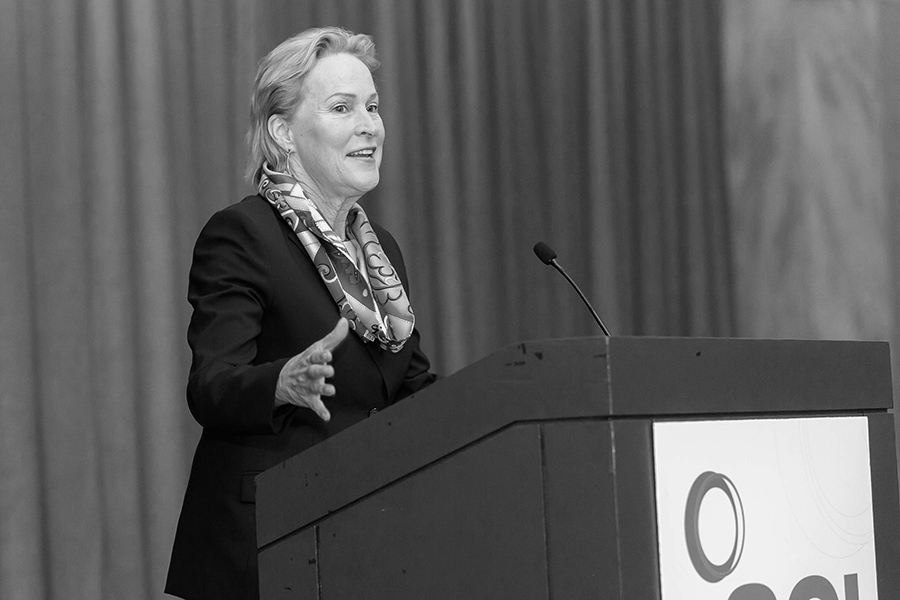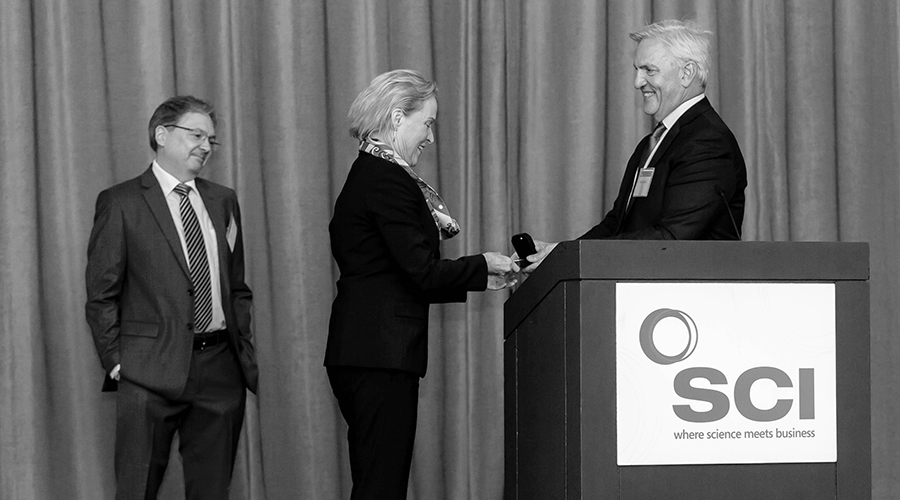Frances Arnold talks to Simon Frost about science in policy, directing evolution, the Nobel Prize, and more.
On the day the 2023 laureates of the Nobel Prize in Chemistry were announced, we caught up with 2018 Nobel laureate Frances Arnold, who was recently awarded SCI's Perkin Medal.
The 2023 Perkin Medal honours Arnold's innovations in directed evolution – an approach she developed for creating new enzymes and improving existing ones. By mutating and recombining the gene that encodes the enzyme, followed by artificial selection for the desired traits, protein engineers can use her approach to "breed" biomolecules – not unlike how farmers breed crops and animals.
Directed evolution is now widely used to create enzymes to make everything from fuels to medicines, chemicals, and consumer goods. Chemical synthesis using laboratory-evolved enzymes is often more efficient and greener than traditional methods.
For her work in this field, Arnold won the 2018 Nobel Prize in Chemistry.
Frances Arnold is Linus Pauling Professor of Chemical Engineering, Bioengineering and Biochemistry at Caltech, US, and co-chairs President Biden's Council of Advisors on Science Technology.

Frances Arnold was awarded the Perkin Medal at the Ritz-Carlton in Philadelphia on 12 September 2023. Image: Rachael Balascak
What drives you?
I do what I love to do every day. I look forward to going to work. I'm interested in a lot of different things, so I work on many different things at the same time, especially now.
In the past, to do the work that I am recognised for, I was single-mindedly focused on demonstrating the power of evolution. I didn't travel a lot, I had three children at home – so, in fact, I was single-mindedly focused on being a mother and then during the day, when I went to work, I was single-mindedly focused on working with evolution.
What made it successful was really the work of other people who demonstrated the power of these methods on so many different problems. So, I guess the other key to success, in my case, was being able to mentor and provide advice to a lot of other people who then went on to use my methods and make them as widely distributed as they are today.
What advice would you give to someone starting in science-based industry?
I always get that question from students who say, “Gee, what do I have to do to win a Nobel Prize?” or something like that. I don't give advice on that. Everyone has his or her own path, and everyone also has his or her own definition of success. And so, I think it's just good to choose to do what you enjoy doing, and then you're successful every day.

Frances Arnold receives the 2023 Perkin Medal. Image: Rachael Balascak
The Perkin Medal recognises innovation in applied chemistry resulting in outstanding commercial development. What real-world applications of your research are you most proud of?
Some of the things that I personally was involved in, in the early days, included making biofuels and jet fuels from biomass – we were one of the very early players in that. It was a very interesting demonstration of how directed evolution could optimise a whole metabolic pathway. That is, by creating new enzymes that didn't exist, or that used cofactors that that we couldn't find, where we couldn't find the enzyme in nature, made the difference for a pathway that worked versus one that was that worked economically at least, or at least partially, favourably. So that was a wonderful demonstration.
Other demonstrations have been done by other people. There's this fabulous work by Merck over the last 10 years, and their biocatalysis and protein engineering teams that work together. They probably have seven or eight people from my lab, mixed in with their much larger teams of chemists and protein engineers. What they've done is shown that they can construct using directed evolution enzymes that will replace chemical processes which generate tremendous amounts of waste.
Frances Arnold explains the concept of directed evolution.
Pharmaceutical production processes are notorious for generating waste, and Merck decided some years ago that that was a good driver to replace those processes with enzymatic cascades. And they, more than anybody else, have demonstrated that this is eminently possible, and have won a number of awards for that work. These processes get rid of toxic metals, reduce organic solvents, and basically reduce the number of steps required to synthesise pharmaceuticals, so I love those demonstrations. And they also do fabulous directed evolution.
There are hundreds of applications of enzymes in everything from laundry detergents to the food industry to clinical diagnostics, to reagents for DNA sequencing, where the enzymes have been improved for all of these applications by directed evolution – because I mean, what self-respecting natural enzyme wants to work in your laundry machine, right? With bleach and surfactants? Usually, that's considered a pretty harsh environment for the enzyme.
So, that was probably one of the biggest applications early on – to improve the ability of enzymes to work under those conditions. And that that's important, because people don't realise how much energy was being used for warm and hot water washing. The enzymes reduced the temperature the water required to wash clothes, and when you spread that all over the world, that's a big energy saving.
It must be very rewarding to see applications developed by other people influenced by your work.
I appreciate those applications. I'm trained as an engineer, and I always wanted to do research that would benefit people or the planet. And luckily, I've been able to see those benefits in my lifetime. And it's a lot of clever applications that I didn't think of – it was the work of many, many other people who thought of them.
As you might imagine – evolution is a pretty powerful method. It's generated everything we've seen in the biological world. So, there's no reason it can't keep going and be used to kind of fine-tune enzymes for our applications. But it's not always easy to do that, so people have really done very clever work to improve the methods and apply them to all these different problems.
You co-chair President Biden's Council of Advisors on Science and Technology. What role do you feel science should play in policymaking?
I think that, of course, from my perspective, science is the centre of decision making, right? Science and just hard looking at the facts – science over fiction, truth over lies. Those were words that were present at my rolling out ceremony in January 2021. Because when science is not used as a basis, we make terrible decisions. And, unfortunately (I'm gonna get a little political here), we had a president for four years before Biden who was not interested in scientific facts, like weather predictions and climate change, and things that were going on that we – and especially our children and grandchildren – are going to have to grapple with.
If we don't make our decisions on policy, on everything from where to place homes, and how to adapt to rising sea levels and future flooding, groundwater and public health issues. All those decisions come out of our scientific understanding of how people interact with each other, how viruses are transmitted, how weather depends on climate change, how climate change depends on our behaviour. All of those things are science-based. And I don't care what you believe or not – there are facts that are out there that we have to grapple with.
Could scientists do more to reach people who are sceptical towards science?
Yeah, I mean, that's the biggest problem – the loss of trust. And that’s in all our institutions, not just science. Science is an institution that used to have the trust of people. Our government had greater trust. For various reasons, that trust has eroded, and people are now listening to their communities. And those communities may be very divisive, right? So, when people go to people they trust to get information, that information may be wrong, or it may be uncertain.
I think scientists have some of the blame in this, because we don't convey uncertainty very well. We don't explain that, in some cases, the facts change! Or the basis of decisions and policies change with the facts, as the facts change – as we learn more about viral evolution, for example, or new facts come in about flooding. You name it. So, we don't do a good job there. And certainly, during the pandemic, we didn't do a good job of communicating to people uncertainty.
The Nobel Prize in Chemistry was awarded this morning.
Announced. It will be awarded in December!
Yes, you're right. Of course, you would know that! So, having been awarded that high honour yourself, what would you say to those researchers, as they wrap their heads around this massive, incredible award?
Use it well – you now have an international platform. Of course, these scientists are well known in the science world, but now their names will be known and carry weight in a much wider world. Use your platform well. Do what you really care about.
You've had a level of success in your career that most scientists only dream of. Are there things that you still hope to achieve? What do you aspire to?
Luckily, I do what I'd love to do every day. So, I aspire to have a long and productive life, using the gifts that I have been given. Working at a wonderful institution, Caltech; having fabulous people in my research group; having a wonderful family. I'm grateful for all of that. And I'd like to use those gifts to make sure that when I leave this planet that I have given more than I've taken.
